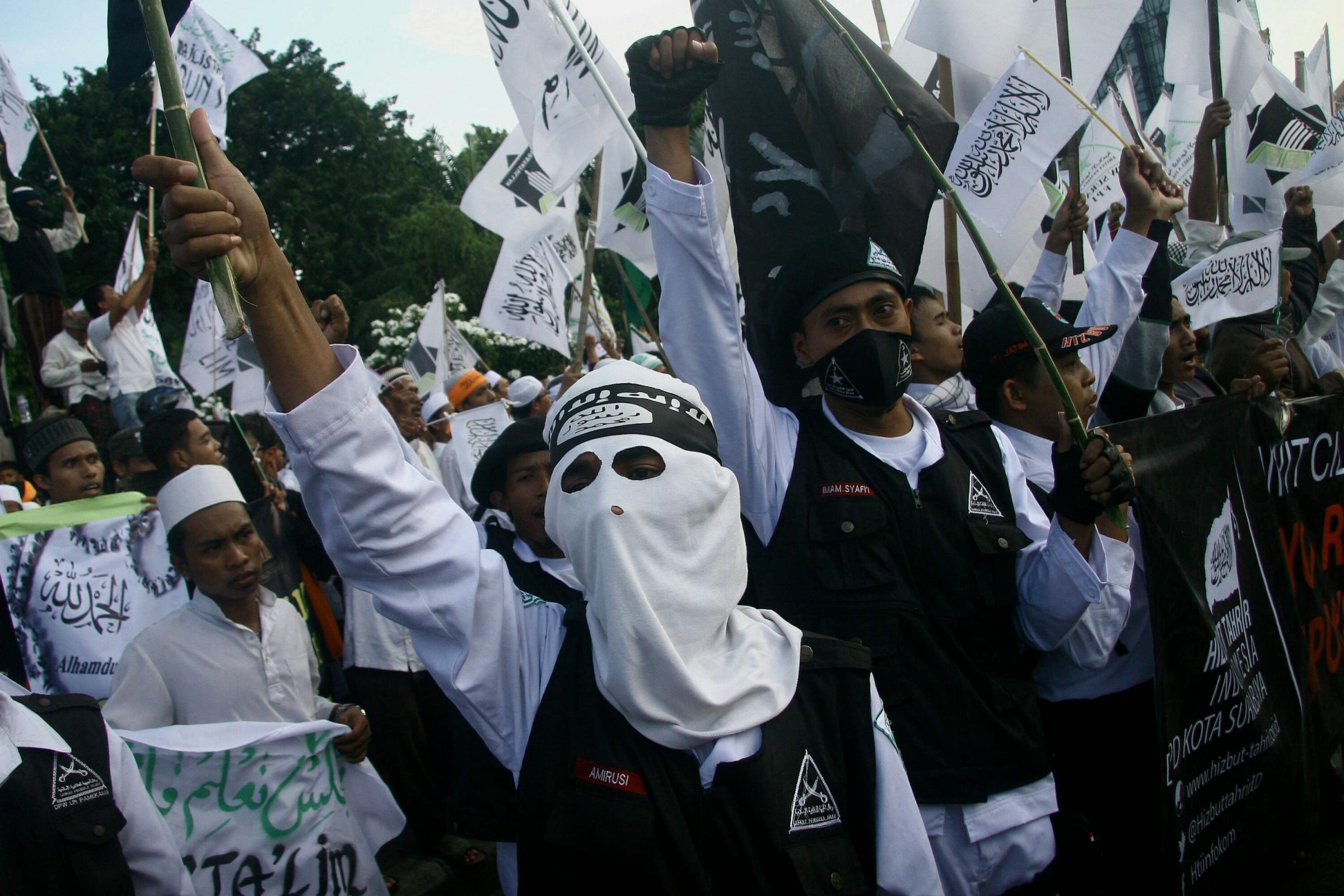
Late in the evening on April 2, a group of around 15 men from the Islamic Jihad Front, a local hard-line group, stormed into Lady Fast, a music event focused on female empowerment in the city of Yogyakarta, Indonesia. The hard-liners called the women “communists” and “trash,” and demanded that the show be immediately shut down. A.Y., one of the event’s organizers who asked to be only identified by her initials, says in an e-mail to TIME that when she tried to reason with the hard-liners, who were busy tearing down posters from the walls, one said to her, “Do you want an argument or a debate? What do you want? You’re a woman, easy enough to punch you!”
The police had already arrived by then, shooting into the air to establish their presence. They did not arrest any of the hard-liners but instead they detained four Lady Fast organizers and participants, questioning them about the nature of their event and about a book on LGBT rights the police discovered at the venue. A.Y. grew frustrated. “It shouldn’t have been me that was brought to the police station, but the man who almost punched me,” she says. She told the police that the book on LGBT rights had been at the venue before Lady Fast began; she was released with no charges a few hours later.
Yogyakarta is vaunted as Indonesia’s bohemian university town, where students from all over a huge and diverse nation gather to study. It is a place of the arts, especially of Javanese culture, and has become a centerpiece of the national government’s new campaign to promote tourism.
But recently, it has also become a centerpiece of a hard-line Islamist campaign to subdue Indonesia’s minority groups — a category that includes Christians, minority Muslim sects, progressive student groups, and the LGBT community. According to the Wahid Institute and the Legal Aid Institute, two organizations that monitor rights abuses in Indonesia, over the past two years more abuses of minority rights have been recorded in Yogyakarta than any region other than deeply conservative West Java province. Examples of recent abuses in Yogyakarta include the burning of a Baptist church, an assault on Afghan Shi‘ite Muslim refugees, the refusal by local government leaders to allow ethnic Dayak students from rural Borneo to hold a traditional ceremony, and the forcible suspension of Pondok Pesantren al-Fatah, which had been the world’s only transgender Islamic boarding school.
“This is quite a significant development in Yogyakarta, actually, in terms of growing intolerance,” says M. Najib Azka, a professor of sociology at Gadjah Mada University in Yogyakarta, the nation’s oldest university, who blamed the city’s government and police force for its refusal to confront hard-line groups.
Municipal authorities have long promoted the city with the slogan “City of Tolerance,” which features on several murals around Yogyakarta. After the attack on Lady Fast, a newly formed progressive group, Solidarity for a Peaceful Yogyakarta, painted a big question mark on each of the murals.
The same question mark could be said to hang over the rest of Indonesia. In 2014, Joko “Jokowi” Widodo, a committed pluralist, won the presidency over Prabowo Subianto, a former special-forces officer who had the backing of Indonesia’s conservative and hard-line Muslim organizations. Jokowi’s victory, and his urging of the police to take action against hard-line groups encouraged progressive hopes that Indonesia finally had a President determined to rein in the ultra-conservatives.
Instead, incidents of intolerance have spiked during Jokowi’s presidency, with the President appearing to focus his attention on reviving Indonesia’s economy in his first 18 months in office. The Setara Institute, an organization that tracks religious violence in Indonesia, recorded 236 cases of religious violence in Indonesia in 2015, the first full year of Jokowi’s presidency, compared with 177 in 2014. Bonar Tigor Naipospos, the institute’s executive director, says, “[Jokowi] thinks improving the economy can solve all problems. He doesn’t have a sufficient understanding of human rights and how to protect minority groups. There are too many cases where the police are simply silent.”
The President’s Office declined to comment for this article. Boy Rafli Amar, chief spokesperson for the National Police, responds to TIME’s questions about the police’s apparent tolerance of hard-line groups via a WhatsApp message. “Intolerant groups that take violent action must be met with a strong response in accordance with the law,” he writes. “We are already undertaking this effort.”
Participants of Lady Fast remain skeptical. “When hard-line groups repressed and intimidated us, why was it the event organizers, as well as participants, who were detained? Why didn’t the police tell the hard-line group to get lost?” asks Pamillia, who participated in the event.
That remains a giant question mark.
More Must-Reads from TIME
- Cybersecurity Experts Are Sounding the Alarm on DOGE
- Meet the 2025 Women of the Year
- The Harsh Truth About Disability Inclusion
- Why Do More Young Adults Have Cancer?
- Colman Domingo Leads With Radical Love
- How to Get Better at Doing Things Alone
- Michelle Zauner Stares Down the Darkness
Contact us at letters@time.com